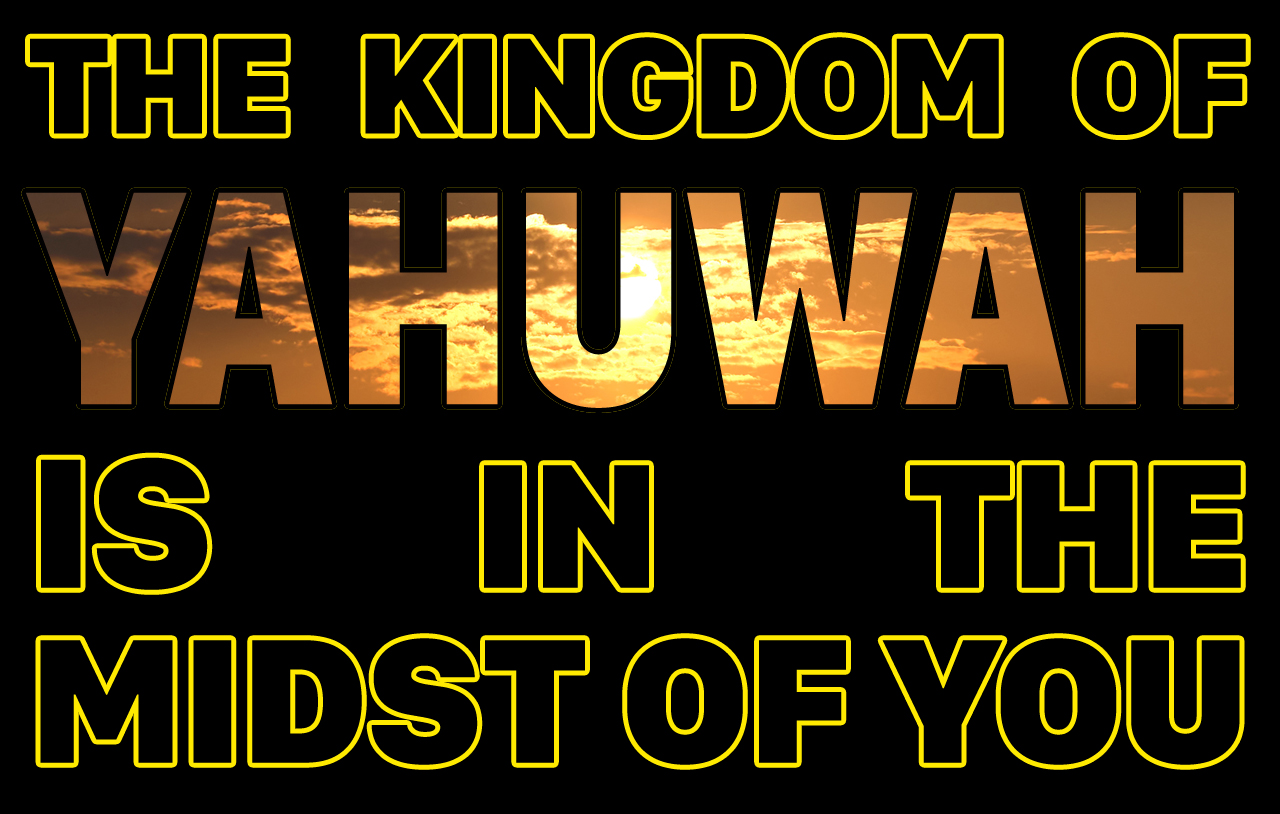|
This is a non-WLC article. When using resources from outside authors, we only publish the content that is 100% in harmony with the Bible and WLC current biblical beliefs. So such articles can be treated as if coming directly from WLC. We have been greatly blessed by the ministry of many servants of Yahuwah. But we do not advise our members to explore other works by these authors. Such works, we have excluded from publications because they contain errors. Sadly, we have yet to find a ministry that is error-free. If you are shocked by some non-WLC published content [articles/episodes], keep in mind Proverbs 4:18. Our understanding of His truth is evolving, as more light is shed on our pathway. We cherish truth more than life, and seek it wherever it may be found. |

“Being asked by the Pharisees when the kingdom of Yahuwah was coming, he answered them, ‘The Kingdom of Yahuwah is not coming with signs to be observed; nor will they say, “Lo, here it is!” or “There!” for behold, the kingdom of Yahuwah is in the midst of you’” (Luke 17:20- 21).
Luke 17:21b is one of the celebrated cruces interpretations [problems of interpretation] in New Testament study, particularly in discussions of the Kingdom of Yahuwah. It was the favorite proof text cited by liberal Protestants to support their contention that the Kingdom of Yahuwah is (and so also for Yahushua was) immanent [indwelling] in human history and society, or, at any rate, in the hearts of men. More recently, it has been construed to mean that Yahushua thought that the Kingdom of Yahuwah was present somehow in his person...
A fact generally overlooked in discussions of Lucan eschatology is that all other references to the Kingdom of Yahuwah in unique Lucan traditions or versions contemplate only a future coming of the Kingdom of Yahuwah — 10:9, 11; 19:11; 21:31; and 22:18. It would, therefore, be exceptional if 17:21b alluded to a present arrival or manifestation of the Kingdom of Yahuwah.
Much discussion has revolved around whether the prepositional phrase entos humon should be translated as “within you” or “in the midst of you.” Harnack, Dodd, and other liberal and/or Platonizing interpreters usually have favored the former option: “The Kingdom of Yahuwah is within your hearts.” But why should Yahushua have told the Pharisees that the Kingdom of Yahuwah was within their hearts (17:20)?...

Most recent interpreters, however, prefer “in your midst” or “amongst you.” The decisive question, in that case, becomes whether Yahushua meant that the Kingdom was already in the midst of his hearers or that, at some future point, it would be in their midst. The fact that estin (“is”) is in the present tense is not decisive...In many of Yahushua’s sayings about the Kingdom of Yahuwah or the resurrection, the present tense is used when the context or meaning implies a future time. Neither “in the midst of you” nor “is” explains the meaning of the half-verse in question. It is necessary to examine the context in which it appears.
Verb tenses in the adjacent verses are significant. The present tense points to the future coming of the Kingdom of Yahuwah in verse containing the Pharisees’ question that introduces the pericope [v. 20], and appears similarly in Yahushua’s response, which is the first part of the sentence that carries through v. 21. Furthermore, the future is intended, and the future tense is used in v. 21a and in the description of events with which the saying closes (17:22-37).
Another prominent context feature, the phrase “not ...with signs to be observed” (RSV) in v. 20b has been variously interpreted...Usually...the term parateresis (“signs to be observed”) and the whole saying have been interpreted in an anti-apocalyptic sense: Yahushua intended to deny that it was possible to predict when the Kingdom of Yahuwah would come by consulting prophecies and deciphering the signs of the times. If the Kingdom had already come, there would be no need at any future time to search for signs of its coming. Is that what Yahushua (or Luke) meant? It is not likely. For one thing, Yahushua and Luke expected the coming of the Kingdom of Yahuwah in the future, whether or not they also thought that it was already present or had come previously.
Furthermore, it is not evident that the term “signs to be observed” in v. 20b should be understood to designate a preliminary apocalyptic sign at all, at least not the kind of sign that could be used as the basis for calculating the “day and the hour.”...Despite this fact, Luke 17:20 is commonly read by those who see it as an anti apocalyptical polemic as if it [meant]: the Kingdom of Yahuwah is not coming after (preliminary) signs. At 17:20ff, however, it is not a matter of preliminary signs. Instead, Yahushua declares there will be no accompanying sign to mark the arrival or imminence of the Kingdom.

The most significant portion of the context has generally been overlooked, namely Luke 17:21a: “Nor will they say, ‘Behold here!’ or ‘There!’” It is exciting that this wording, which appears here in connection with the arrival of the Kingdom of Yahuwah, is repeated nearly verbatim in v. 23 but with explicit reference to the future arrival of the days of the Son of man. This parallelism or repetition suggests what is generally evident elsewhere in the synoptic tradition, that Yahushua associated the coming of the Kingdom of Yahuwah with the coming of the Son of man. The latter event is thought of as still future (v. 23ff). But while v. 21a reads, “...nor will they say, ‘Lo, here!’ or ‘There!’ v. 23 reads, ‘And they will say to you, ‘Lo, there! Lo, here!’ Why do the prospective bystanders on one occasion claim to have identified or located the Kingdom of Yahuwah (and/or the days of the Son of man) but on another occasion keep silent? How to explain this apparent contradiction? What is the point here? In particular, why, on the one occasion, will they not say, ‘Lo, here!’ or ‘There!’?
The Pharisees, Luke says, have asked Yahushua when the Kingdom of Yahuwah is coming. He replies that it's coming is not or will not be accompanied by a sign (17:20b). They do not ask him about signs. His reply, however, passes over their question concerning “when.” Instead, he answers as if they had asked him whether there would be some sign by which the arrival of the final period could be identified as if he were responding to the second part of the question raised by the disciples in Matt. 24:3=Mark 13:3=Luke 21:7.
Interpreters generally have overlooked that Luke 17:21a is also a response to this latter kind of question, which may be implied in the first: when the time comes, how will men know that the Kingdom of Yahuwah is here? What is said in 17:23ff is obviously in answer to this second point: when the Son of man comes, there will be no mistake. Thus, those who in the meantime, in the interim before he comes, say “Lo, there!” or “Here!” should be ignored, “for just as the lightning flashes and lights up the sky from one side to the other, so will the Son of man be in his day.” Those guides who will point to some sign or clue to prove that the days of the Son of man have come, or will offer to lead Yahushua’s disciples to a hidden Son of a man somewhere, will be in error, therefore, and the disciples should not follow them. This is the meaning of Matt. 24:26ff; Luke 21:8, and perhaps, of the “vultures” saying in Matt. 24:28=Luke 17:37.
Yahushua had stated, against the desire of the Pharisees and “this generation” for a sign, that none would be given (Mark 8:11ff). The Markan context does not show whether Yahushua (or the Pharisees) had in mind a future sign that would (or would not) accompany the eschatological events or a sign that would be given in advance. Perhaps the Pharisees sought a sign that would demonstrate Yahushua’s prophetic authority. Signs and wonders are mentioned in Mark 13:22=Matt. 24:24; however, these are to identify the presence of false prophets and false Christ. Such might point to signs as evidence of “realized eschatology” (Mark 13:21- 23=Matt. 24:23-26), but when the real Son of man comes, there will be no need for signs of the times. The evidence will be visible and incontrovertible (Matt. 24:27; Mark 13:24-27 and parallels).

The negative statement “nor will they say: lo here, or there” in v. 21a and the positive declaration “and they will say to you ‘lo, there, lo here’” in v. 23a do not contradict each other. In both instances, Yahushua says the same thing about the Kingdom of Yahuwah or the Son of man. In the earlier saying, the point is that the Kingdom will not come with an accompanying sign, i.e., in such a way that it will be necessary to look for some way of verifying it in case of doubt. The latter saying warns that in the coming days, before the Kingdom of Yahuwah has come and while the disciples are passionately longing for the coming days of the Son of man, some will claim to have found him (the Son of man), or it (the Kingdom of Yahuwah), but the disciples must not be misled, for the arrival of the Kingdom of Yahuwah and Son of man will be so distinctive as to be self-evident and self- authenticating. There is no doubt about it.
The parallelism extends beyond the anticipated silence and exclamations of the future bystanders; in each case, their responses are explained by reference to the character of the coming events, and the explanation is introduced by the conjunction “for. Verse 24 explains that the disciples are not to follow those who will mistakenly say “Lo, there!” or “Here!” for when the Son of man or the day of the Son of man comes, it will be just as evident as when the lightning flashes from one side of the sky to the other (cf. Mark 13:24-26). Similarly, our crux interpretations, v. 21b, follows v. 21a to explain why, when the Kingdom of Yahuwah really comes (or while it is coming), the bystanders will not say, “Lo, here!” or “There,” the reason being that then the Kingdom of Yahuwah will be visibly and dramatically in their midst. When the Kingdom of Yahuwah comes, one will neither have to look for any unique sign to identify it nor need a guide to find it somewhere.
The reason it is pointless to look for signs is not that the coming of the Kingdom of Yahuwah and the Son of man will be invisible, but that, on the contrary, it will be universally and unmistakably visible, “as the lightning flashes and lights up the sky from one side to the other.” That is why the bystanders will not say, “Lo, here!” or “There!” And that is why those who say “Lo, there!” or “Here!” are to be ignored...
In 17:21b Luke understands Yahushua to have meant that the coming of the Kingdom of Yahuwah would be a future, obvious, and all-encompassing event...All of the sayings in Luke 17:20-18:8 have to do with the coming of the Kingdom of Yahuwah and the Son of man and with the responses men will or should make in the interim and at the time the Kingdom and Son of man are revealed. This section clearly shows that these decisive events will take place in the future...Elsewhere also, as mentioned, the peculiarly Lucan material speaks only of a future coming of the Kingdom of Yahuwah...There is...no reason to suppose that Luke thought the Kingdom of Yahuwah had come or appeared in or with Yahushua and his ministry. Lucan eschatology is unequivocally futuristic, so far as the Kingdom of Yahuwah is concerned.
What Yahushua meant by the saying in Luke 17:20ff...cannot be determined as a matter of certainty....However, it does not support the view that Yahushua considered the Kingdom of Yahuwah to be present in his person, or, for that matter, present at all. On the contrary, these verses point to its appearance dramatically and unmistakably in the future. When Luke 17:21b is taken in its context, the meaning emerges clearly enough: when the Kingdom of Yahuwah comes, everyone will know it; there will be no need for authenticating clues or signs. Such also was the OT expectation — “the glory of the Lord shall be revealed, and all flesh shall see it together” (Isa. 40:5).

This is a non-WLC article by Dr. Richard Hiers.
We have taken out from the original article all pagan names and titles of the Father and Son, and have replaced them with the original given names. Furthermore, we have restored in the Scriptures quoted the names of the Father and Son, as they were originally written by the inspired authors of the Bible. -WLC Team







